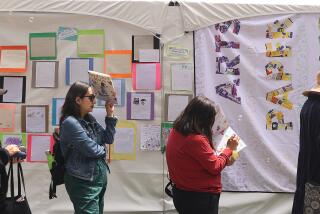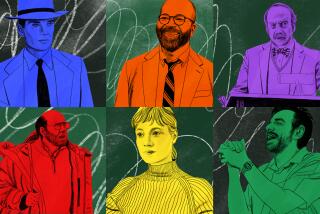Great Read: At West Point, warriors shaped through Plutarch and Shakespeare
So crisp in the morning light they were, nine cadets, dressed in fatigues and sand-colored boots, hearing the curious news that the poet would outlive the warrior. Shakespeare’s rhyme lingered as if a sacrilege on a campus where soldiers have been mythologized for generations and graduates have been pressed into heroes and presidents.
“The poet grants immortality,” said literature professor Elizabeth D. Samet. “His power trumps any others.”
The students in her class on the second floor of Lincoln Hall are used to such insights. For nearly 20 years, Samet has been a popular and evocative voice at the U.S. Military Academy at West Point, where the reading lists for her courses veer from urbane essays by Zadie Smith to the “Meditations” of Roman Emperor Marcus Aurelius. One of her former students, an infantry officer “as tough as they make them,” is smitten with the confessional poetry of Anne Sexton.
On a stone and granite campus where tradition and rigidity are heirlooms, Samet is distinctive for drawing on centuries of literature to teach prospective second lieutenants about the psychological puzzles and ethical ambiguities of war.
Many in her classes have gone on to serve in Iraq and Afghanistan; two have died in action, including Capt. Daniel P. Whitten, who quoted from T.S. Eliot’s poem “The Waste Land” in his yearbook: “I will show you fear in a handful of dust.”
Samet, the daughter of a World War II Army Air Forces soldier, kept a bond with Whitten and other former students over the years, exchanging letters and emails and deliberations on Alexander the Great, Plutarch, E.B. White and Robert Pirsig’s “Zen and the Art of Motorcycle Maintenance.” She has glimpsed the courage and disillusionment, adventurous zeal and contemplative musings of young men and women who have ventured beyond these hermetic walls to the battlefield and back to an ambivalent country that offers a whispered “Thank you for your service.”
Samet moves with the swift, erect glide of a plebe; red-rimmed glasses; hair, short and neat; nose sharp as a prow. Her unbroken sentences flash with occasional humor: “If you can spend an hour on a sonnet, that’s a great victory.” One of her favorite plaques at West Point honors the cavalry horses of wars past.
She is respectful of Army folklore but wary of its vernacular. In a military where war’s cruelties often hide in masquerade, Samet bristles at euphemisms such as “limited conflicts” and “low intensity” missions.
“People are fighting and dying regardless of what you call it,” she said. “There is a clinical language to discuss war and a grossly sentimental language.”
::
Samet, 45, is a polite provocateur, urging more intellectual openness in the military while admonishing the nation for not examining the consequences of what it asks its soldiers to endure. West Point has granted her academic freedom; she says the institution, whose key purpose is developing officers, has not sought to alter what she teaches.
Lessons from literature, she said, can guide soldiers “to follow lawful orders and never surrender their moral judgment.”
“I think sometimes people mistake my emphasis on creativity and imagination as a rejection of discipline and regimentation,” says Samet, who keeps a bike parked along her office bookcase, which includes copies of the Koran, “The Odyssey” and verse by Russian-born poet Joseph Brodsky. “But instead, I think they are the central components of these future officers’ lives.”
In her essay class last month, Samet and her students discussed texting, Ebola, World War II concentration camps, Lawrence of Arabia, the film “Dallas Buyers Club” and Shakespeare’s Sonnet 55, which states that the poet’s words to his lover will outlast “gilded monuments” and “war’s quick fire.” The professor told her cadets — seven men and two women — that “so long as people are around to read the poem, it has a life. It is a living rhyme.”
Cyrus Cappo, 20, a sophomore whose family lives in Huntington Beach, stopped by Samet’s office after class. He had a flop of light brown hair that seemed within a centimeter of breaking regulation. He was partial to novelist Albert Camus. “He challenged a lot of my preconceived notions about life,” said Cappo, whose brother graduated from West Point in 2012. “Given the authoritarian institution I’m in, reading Camus gives me [license] to challenge authority.”
He smiled and mentioned that after the military, he might buy a school bus on EBay and live along a river to think. He’s been reading about Morocco, Libya and Tunisia, and he said the film “A Separation” by director Asghar Farhadi “blew the lid off all the stereotypes I had of Iran.” The book that has impressed him most, though, is “Meditations” and how Aurelius relied on “selflessness, sacrifice and empathy” to rule an empire.
“Contemporary media maybe glorify war too much. The American soldier is put on a pedestal,” he said. “Hero worship is dangerous. It sets them up to cast them down.”
He worries that the long wars in Iraq and Afghanistan have turned into “white noise” on the home front and stresses that “the end result of any battle is peace. You have to understand you’re not fighting against nameless, faceless people.”
::
Samet grew up in the Boston suburbs, the daughter of an accountant reluctant to tell war stories. She graduated from Harvard and went on to Yale to study 18th and 19th century literature. She was drawn toward military writing and came upon the memoirs of Ulysses S. Grant. The memoirs — published by Mark Twain — were stark in their honesty.
Of his disdain for the Mexican-American War, Grant wrote: “I was bitterly opposed to the measure, and to this day regard the war … as one of the most unjust ever waged by a stronger against a weaker nation.”
The candid prose and introspection were a revelation, and when Samet mentioned Grant, her voice changed, as if to keep him separate from the rest.
“I was attracted to the undramatic, matter-of-fact way he had of describing his service,” she said. “It had none of the romance and self-absorption of some military memoirs. It struck me as a really interesting, modern voice, and I didn’t expect it.”
After receiving her doctorate in English literature at Yale, she joined the West Point faculty in 1997. Over the years, she has directed the introduction to literature that’s a requirement for 1,100 incoming freshman. Course work encompasses “The Iliad” and Shakespeare; “Hamlet” and “Richard II” are particularly instructive for cadets.
Samet, who in her off time rides her bike on the winding roads beyond campus, has written two books, the critically acclaimed “Soldier’s Heart” about her teaching experiences, and “No Man’s Land: Preparing for War and Peace in Post-9/11 America,” an examination of the numbing toll on soldiers shuttling back and forth from battle.
“Dr. Samet has had a huge influence on me,” said Ian McWilliams, a senior sociology major. He’s writing a thesis on the difficulties soldiers have switching from the battlefield to the homefront. “They feel an injustice of not being there making a sacrifice,” he said. “They just want to get back to where all those [unspoken] things between soldiers are understood.”
He looked toward the window. The Hudson River flowed past trees yet to bloom. Boot steps scraped in a stairwell. Faded. A door closed. McWilliams dispatched sentences as if small, brisk battalions.
Literature, he said, “shows us that it is possible to endure nobly.” He spoke of “The Tempest,” “Metamorphosis” and the Roman poet Ovid. He mentioned that he liked Hermann Hesse’s “Siddhartha,” a contemplation on spirituality and Buddhism. A few minutes later, McWilliams, whose grandfather graduated from West Point in 1948, packed up his books and said, “I really hope I get to deploy.”
Samet has grown accustomed to such sentiment. It is the currency of this campus; a poet may outlive the warrior, but the warrior, no matter how well-read, needs his battle.
Just before lunch, she left her office and walked the grounds, stopping for a moment in Cullum Hall, where the names of West Point graduates who have died in the nation’s wars are carved. The names begin at the War of 1812 and stretch to the “Global War on Terrorism (2001-- ),” where two of Samet’s former students are listed: Whitten and 1st Lt. Christopher S. Goeke.
She stepped outside. A light wind swept off the river, past Cadet Chapel and the memorial to Civil War soldiers. It had been a long winter. The sun crept higher; cadets hurried along sidewalks and across damp fields. So many of them have passed through her classes over the years, young, raw, anxious, as Grant was more than 170 years ago, to measure up.
Samet’s reverence for the Army and its soldiers, but also her skepticism about the myths that shape them, is distilled in the last chapter of “No Man’s Land.”
“The most persuasive solution a teacher can offer are the students she casts into no man’s land: officers capable of reflecting on where they’ve come from and imagining where they might be going; leaders capable of telling stories but also of recognizing when those stories have lost their power and become obsolete; men and women willing not only to rewrite their own narratives but to contribute to the re-invention of a national narrative that will bear the weight of future meaning.”
Twitter: JeffreyLAT
More to Read
The biggest entertainment stories
Get our big stories about Hollywood, film, television, music, arts, culture and more right in your inbox as soon as they publish.
You may occasionally receive promotional content from the Los Angeles Times.






